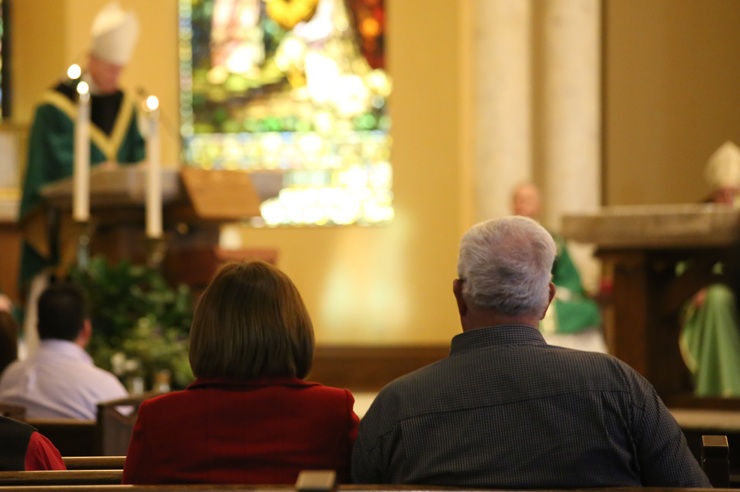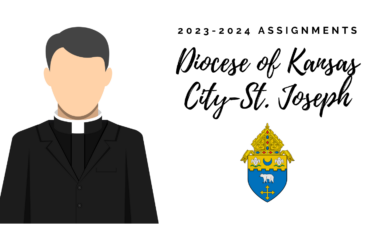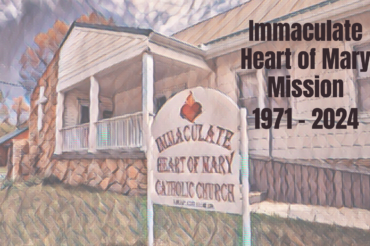World Marriage Day Mass Homily
It is a blessing to be with all of you again for this World Marriage Day, and to join Archbishop Naumann and all of you in thanksgiving for the gift of Married Love in our Church and Society.
World Marriage Day is always held on the second Sunday of February, and it began as an initiative of Worldwide Marriage Encounter. And so we must also thank all those associations and organizations that serve Marriage: Worldwide Marriage Encounter, Retrovaille, our own diocesan offices of Marriage and Family life, and so many others who have helped countless couples to strengthen their married love with good advice, support and the love of other couples.
We are especially grateful for how marriage and family strengthens our local Churches, the Archdiocese of Kansas City here in Kansas and the Diocese of Kansas City-St. Joseph in Missouri.
One of the duties of a bishop that you may not know about is that periodically we are supposed to check the sacramental registers of our parishes. Often when I visit a parish, at a time when it is not too busy, I will review the books for all the sacraments to make sure they are up-to-date and well kept. (It’s sort of like making sure the pastor is doing his homework!) The two books I am most interested in are the baptismal register and the marriage register; these record the essential information for every baptism and marriage celebrated in a parish over the years. Those books tell me about the health of a parish and even the future of a parish, and by extension, the health and future of the diocese. And, if you show me one register, I can predict what the other will look like. A parish with lots of marriages, will also have lots of baptisms, and that parish likely has a bright future.
Simply put, the future of the Church rests on marriage and family life. The same is true for whole of society. That is why treasuring, fostering, supporting, and strengthening marriage and family is a priority for all of us. Families are an icon of the Holy Trinity, the Divine communion of love that is creative. And, the Church itself is a family—the family of God. Likewise, in the mystery of how God has chosen to reveal Himself to the human race in the history of Israel and in the person of Jesus Christ, Marriage is a common thread that gives meaning to God’s revelation of Himself and His relationship with us as creatures. The Bible begins with a marriage in Genesis and ends with marriage in the Book of Revelation: the wedding banquet of the Lamb, the marriage of Christ, the divine Bridegroom and His Bride, the Church. In between, the image of marriage permeates the Scriptures, from the Prophets, to the Psalms to the Song of Songs, to the Parables that Jesus tells about the Kingdom of God, to the teaching of St. Paul that the marriage of husband and wife points to the “great mystery” of Christ and the Church (cf. Eph 5:32).
The free, total, faithful, fruitful communion of a man and woman in marriage is a sign to the world of the free, total, faithful, fruitful communion that is God in the Holy Trinity.
And so, the family has a mission so vital that humanity either stands or falls by it.
[In Familiaris Consortio,] St. John Paul the II wrote about this saving mission of the family. He said that simply by becoming what it is—a “community of life and love”—the family is a “saved and saving community” at the heart of the Church’s mission. “The family,” John Paul II wrote, “has the mission to guard, reveal and communicate love, and this is a living reflection of and a real sharing in God’s love for humanity and the love of Christ the Lord for the Church his bride … Family, become what you are!” FC, 17.
As we celebrate World Marriage Day, we might highlight three things that the gift of married love can offer that are especially needed today. The first is to reinforce the truth that your life does not belong to you.
In the last few years, we have begun to hear reports from some colleges that among those students of incoming classes of college freshmen, atheists and agnostics now outnumber professed Christians and Jews. Father Robert Barron has written about the link between the absence of God and the rise of things like assisted suicide. When there is an absence of God, for Whom we were created to worship, we substitute some other value as the highest good, and we are left with the belief that our lives belong utterly to us.
As the Bible tells it, this is precisely where the wheels came off at the beginning–at the moment Adam took to himself the prerogative of determining the meaning of his life apart from God, when, in the poetic and profound words of Genesis, he ate the fruit of the knowledge of good and evil. All sorts of bad fruit arise from this, and we see it around us.
The rest of the Bible is the story of God showing human beings that in fact, their lives do not belong to them. This culminates in Jesus, who embodies what God intended for us from the beginning. Our lives are gifts that are made for giving away.
Marriage, by its very nature, reveals this. A man and woman make a total gift of self to the other without condition or reservation. And, the daily duties and events of family life are a constant reminder that one’s life is not one’s own. We are made to give ourselves away in imitation of God. Because the old tendency of Adam is still there though, Christ gives his grace in the sacrament to help.
That’s the first important witness: to the fact that my life does not belong to me.
The second important witness is to the fact that our greatness is found in the ordinary events of life.
One of my favorite films to watch each year is Frank Capra’s, It’s a Wonderful Life. The main character, played by Jimmy Stewart, is named George Bailey. George is frustrated because his ambitions to leave his little town to pursue travel and greatness in the big city were never realized. Events that arose in his life kept him in his ordinary little town with its ordinary people and ordinary problems. The movie begins with George contemplating suicide because he believes his life is a failure. In his eyes, he has not become extraordinary.
The beauty of the film is that, with the help of a guardian angel, George comes to realize just how extraordinary is life really is. How, in taking care of his wife and their children, and sacrificing his time and self for others, so many people have been blessed.
The same is true in every family. Extraordinary things occur there; and you become extraordinary there.
The media bombards us with what is defined as “extraordinary”—those who possess success, fame and wealth. We must always remember that we worship and follow Jesus. The Jesus, who, in today’s Gospel, didn’t want this miraculous healing of the leper to be pubic, but discreet. Jesus, who was God and man, yet only lived on earth for 33 years, of which most of those were unknown, and lived in a backwater of a place like Nazareth. His mother was a housewife and his father on earth was a local handyman carpenter. When he explicitly taught us to imitate him, it was to be meek and humble of heart. And, interestingly, when the devil tempted him, it was to do “extraordinary” things.
Marriage and life in the family is so important because this is the place where we learn to be like Jesus … in the everyday events; the joys and the sorrows; the trials and the triumphs; the spills and the scrapes, the laundry and the meals together; the sins and the forgiveness that follows.
Saint Francis DeSales, who could be considered the “saint of ordinary life” said: “Persevere in overcoming yourself in the little, everyday frustrations that bother you; let your best efforts be directed there. God wishes nothing else of you at present, so don’t waste your time doing anything else … don’t long to be other than what you are, but desire to be thoroughly what you are. Direct your thoughts to being very good at that and to bearing the crosses, little or great, that you will find there. Believe me this is the most important and least understood point in the spiritual life.”
“… the most important and least understood point in the spiritual life.” Marriage and family life remind us that we become extraordinary within the ordinary.
Finally, marriage and family reinforce the truth that true love is creative.
Recently, I was watching an interview on television of a top brain surgeon who was researching where creativity comes from. He was fascinated by the creative abilities of certain people, like musicians who can create music spontaneously (he showed a clip of a jazz pianist who in each concert plays a spontaneous and complex piece that is never repeated and was never rehearsed before.) The surgeon was trying to locate where in the brain that creativity comes from.
While the brain has an important part to play in artistic creativity, God has revealed that love is ultimately behind creation. And true love, lived out in marriage is ordered toward creating new life.
This year marks the 50th anniversary of the critically important Encyclical, Humanae Vitae, a prophetic document that continues to provide light for our confused times about the inseparable link between the unitive and procreative meanings in the marital act which consummates the union of husband and wife.
I, along with Archbishop Naumann, am grateful to the many couples who share the good news which flows from walking this path, by promoting this way of life through what is often called “Natural Family Planning.” Essentially, it is a decision to embrace the loving design of the Creator for married love, with a choice to not intentionally sever the tie that binds love to life.
The Church accompanies couples in a responsible openness which accounts for their circumstances and is guided by a deeper understanding of the design of fertility in the human person.
At every marriage, the priest says just after the wedding promises of the couple, “What God has joined, man must not divide.” What is true for the couple is also true for the act that expresses that union: love that is ordered to life cannot be divided.
These are three things of importance that Married Love and Family Life can especially witness to today: our lives are not our own, we become extraordinary in the ordinary, and true love is creative.
All of this takes place in the confusion and the chaos that often accompanies life in every family. It is imperfect, and takes patience and perseverance, like anything important. But, there are few things more critical in the life of the Church and our World. It is true that the future of humanity passes by way of the family, including your families.
Thank you for your commitments, thank you for your love, thank you for your witness.
+ Bishop James V. Johnston, Jr.
Homily for the Feb. 11, 2018 World Marriage Day Mass at the Church of the Ascension in Overland Park, Ks.




